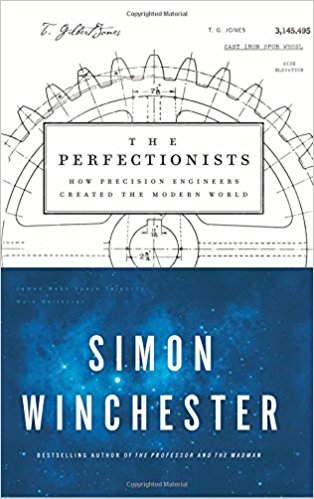You have /5 articles left.
Sign up for a free account or log in.
 The Perfectionists: How Precision Engineers Created the Modern World by Simon Winchester
The Perfectionists: How Precision Engineers Created the Modern World by Simon Winchester
Published in May of 2018.
Two shows that I watch are Westworld and Humans. I’d probably watch any show built around sentient robots. At their cores, these shows less about robots, and more about our fear of tomorrow’s technology. In both of these shows, and in much of the entertainment that I consume, the narrative tension comes from human overreach and the unintended consequences of technological progress. These are techno-driven dystopias
With all these techno-future worry, it is a welcome corrective to read a book about the history of technology. If everything is going to go to hell in the future, and if robots are going to first take all of our jobs and then turn against the humans that created them, it is at least good to understand how we got to where we are now.
The Perfectionists is the story of material progress, and how that progress depends on ever levels of greater technological precision. Winchester uses the lens of precision - precision defined in the engineering and mathematical senses of tolerances - to examine the sweep of technological progress.
From steam engines to interchangeable parts, the industrial revolution was built on ever greater feats of precision craftsmanship. The modern industrial economy of the late 19th and 20th centuries, an economic era best embodied by the Ford’s automobile production line, also was built on advances in manufacturing precision. Our 21st century digital economy of the smart phone and the smart car depends on the perfection of the physical components, the microchips and the sensors and the like, from which our devices are assembled.
In The Perfectionists we learn the origin stories of many of the technologies that enable modern life, and whose ubiquity and reliability have rendered them largely invisible.
Amongst my favorite examples in the book is Winchester’s telling of the invention of the jet engine. The next time you fly take a moment to think about the engines that are keeping you aloft at 30,000 feet. The jet engine is likely the most precisely engineered and advanced piece of technology that we regularly depend. It is ironic that we should be so unconcerned while in flight about today’s jet engines, while so constantly worried about tomorrow’s robots. Reading about the creation and operation of a technology as magnificent, improbable and wildly complicated as the jet engine is one of the treats of The Perfectionists.
Precision engineering and manufacturing were concepts that I’d previously not given much thought. This book has forever changed how I think about our material world. The Perfectionists is a precisely crafted history of technological progress.
Winchester wrote The Perfectionists as a result of a single e-mail, a recommendation from one of his readers. So I’ll close this review with a suggestion to Winchester.
Simon, your next book should be about those people creating tomorrow’s precise devices. You should write about the creation of self-driving cars and adaptive learning platforms and all those robot stealing jobs. How do the creators of the next wave of technology think about their work, and the fear that we have of what those efforts will bring? What is actually involved in creating technologies that need no human intervention once created?
Do you think that the more we learn about the history of technology the less we will worry about the future of technology?
What are your favorite books on the history of technology?
What are you reading?








